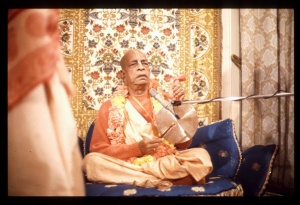SB 3.28.5: Difference between revisions
m (1 revision(s)) |
No edit summary |
||
| Line 1: | Line 1: | ||
{{info | {{info | ||
|speaker=Lord Kapiladeva the Supreme Personaliy of Godhead | |speaker=Lord Kapiladeva the Supreme Personaliy of Godhead | ||
|listener=Devahūti, mother of Lord Kapiladeva | |listener=Devahūti, mother of Lord Kapiladeva | ||
}} | }} | ||
[[Category:Srimad-Bhagavatam - Canto 03 Chapter 28|S05]] | |||
[[Category:Bhagavatam Verses Spoken by Lord Kapila - Vanisource|032805]] | |||
<div style="float:left">'''[[Srimad-Bhagavatam]] - [[SB 3|Third Canto]] - [[SB 3.28: Kapila's Instructions on the Execution of Devotional Service|Chapter 28: Kapila's Instructions on the Execution of Devotional Service]]'''</div> | |||
<div style="float:right">[[File:Go-previous.png|link=SB 3.28.4]] '''[[SB 3.28.4]] - [[SB 3.28.6]]''' [[File:Go-next.png|link=SB 3.28.6]]</div> | |||
{{RandomImage}} | |||
==== TEXT 5 ==== | ==== TEXT 5 ==== | ||
<div | <div class="verse"> | ||
maunaṁ sad-āsana-jayaḥ | :maunaṁ sad-āsana-jayaḥ | ||
sthairyaṁ prāṇa-jayaḥ śanaiḥ | :sthairyaṁ prāṇa-jayaḥ śanaiḥ | ||
pratyāhāraś cendriyāṇāṁ | :pratyāhāraś cendriyāṇāṁ | ||
viṣayān manasā hṛdi | :viṣayān manasā hṛdi | ||
</div> | </div> | ||
| Line 16: | Line 22: | ||
==== SYNONYMS ==== | ==== SYNONYMS ==== | ||
<div | <div class="synonyms"> | ||
''maunam''—silence; ''sat''—good; ''āsana''—yogic postures; ''jayaḥ''—controlling; ''sthairyam''—steadiness; ''prāṇa-jayaḥ''—controlling the vital air; ''śanaiḥ''—gradually; ''pratyāhāraḥ''—withdrawal; ''ca''—and; ''indriyāṇām''—of the senses; ''viṣayāt''—from the sense objects; ''manasā''—with the mind; ''hṛdi''—on the heart. | |||
</div> | </div> | ||
| Line 23: | Line 29: | ||
==== TRANSLATION ==== | ==== TRANSLATION ==== | ||
<div | <div class="translation"> | ||
One must observe silence, acquire steadiness by practicing different yogic postures, control the breathing of the vital air, withdraw the senses from sense objects and thus concentrate the mind on the heart. | One must observe silence, acquire steadiness by practicing different yogic postures, control the breathing of the vital air, withdraw the senses from sense objects and thus concentrate the mind on the heart. | ||
</div> | </div> | ||
| Line 30: | Line 36: | ||
==== PURPORT ==== | ==== PURPORT ==== | ||
<div | <div class="purport"> | ||
The yogic practices in general and haṭha-yoga in particular are not ends in themselves; they are means to the end of attaining steadiness. First one must be able to sit properly, and then the mind and attention will become steady enough for practicing yoga. Gradually, one must control the circulation of vital air, and with such control he will be able to withdraw the senses from sense objects. In the previous verse it is stated that one must observe celibacy. The most important aspect of sense control is controlling sex life. That is called brahmacarya. By practicing the different sitting postures and controlling the vital air, one can control and restrain the senses from unrestricted sense enjoyment. | The yogic practices in general and ''haṭha-yoga'' in particular are not ends in themselves; they are means to the end of attaining steadiness. First one must be able to sit properly, and then the mind and attention will become steady enough for practicing ''yoga''. Gradually, one must control the circulation of vital air, and with such control he will be able to withdraw the senses from sense objects. In the previous verse it is stated that one must observe celibacy. The most important aspect of sense control is controlling sex life. That is called ''brahmacarya''. By practicing the different sitting postures and controlling the vital air, one can control and restrain the senses from unrestricted sense enjoyment. | ||
</div> | </div> | ||
__NOTOC__ | |||
<div style="float:right; clear:both;">[[File:Go-previous.png|link=SB 3.28.4]] '''[[SB 3.28.4]] - [[SB 3.28.6]]''' [[File:Go-next.png|link=SB 3.28.6]]</div> | |||
__NOTOC__ | |||
__NOEDITSECTION__ | |||
Revision as of 07:58, 9 May 2021

A.C. Bhaktivedanta Swami Prabhupada
TEXT 5
- maunaṁ sad-āsana-jayaḥ
- sthairyaṁ prāṇa-jayaḥ śanaiḥ
- pratyāhāraś cendriyāṇāṁ
- viṣayān manasā hṛdi
SYNONYMS
maunam—silence; sat—good; āsana—yogic postures; jayaḥ—controlling; sthairyam—steadiness; prāṇa-jayaḥ—controlling the vital air; śanaiḥ—gradually; pratyāhāraḥ—withdrawal; ca—and; indriyāṇām—of the senses; viṣayāt—from the sense objects; manasā—with the mind; hṛdi—on the heart.
TRANSLATION
One must observe silence, acquire steadiness by practicing different yogic postures, control the breathing of the vital air, withdraw the senses from sense objects and thus concentrate the mind on the heart.
PURPORT
The yogic practices in general and haṭha-yoga in particular are not ends in themselves; they are means to the end of attaining steadiness. First one must be able to sit properly, and then the mind and attention will become steady enough for practicing yoga. Gradually, one must control the circulation of vital air, and with such control he will be able to withdraw the senses from sense objects. In the previous verse it is stated that one must observe celibacy. The most important aspect of sense control is controlling sex life. That is called brahmacarya. By practicing the different sitting postures and controlling the vital air, one can control and restrain the senses from unrestricted sense enjoyment.